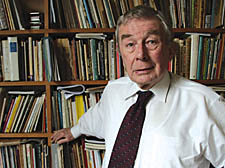|
|
 |
| |

Alan Brownjohn: the freezing winter of 1946/47 was the ‘most vivid climatic event’ of his lifetime |
When we last hit the skids
Poet Alan Brownjohn tells Simon Wroe that his new novel draws on memories of post-war austerity
WINDOWS ON THE MOON
by Alan Brownjohn
Black Spring Press £15
SUDDEN snowfall in February and a frosty economic climate for all seasons are very 2009 concerns, but to the writer Alan Brownjohn they are strangely familiar portents.
The poet, who has lived in Belsize Park for nearly 40 years, has just published his fourth novel, Windows on the Moon, an historical fiction about post-war London during the ferocious winter of 1946/47.
Brownjohn, 16 at the time, remembers this winter as “the most vivid climatic event in my lifetime,” an experience compounded by food rations, threadbare clothes and economic torpor.
Using his adolescent diaries as inspiration, the cold front forms the backdrop for the interweaving narratives of a dozen or so characters from a small, close-knit community in south-east London, an area in which “everywhere bore signs of wartime deprivation but claimed smartness with conviction”.
“Looking back on that period is looking back on a lunar landscape,” Brownjohn explains. “It’s a world away. But having said that, some things have come full circle. Of course, people didn’t talk of a downturn in the 1940s – ‘austerity’ was the word, and ‘reconstruction’ was another.
“The life of shortages you got used to during the war went on after the war. It was everybody’s central experience. To survive the Second World War you had to have a serious grip on life.”
The moral climate was totally different too, admits Brownjohn.
“I think the teenagers of that era may be the most conformist [of all],” he says. “There was a feeling with fathers coming back from the forces: the need to get the household together again, the need to get their jobs together again. This was felt by the children in that period. We were more serious.
“The atmosphere now is not yet puritanical. We haven’t yet abandoned elaborate fashions and elaborate consumption. When I was writing the book I very consciously thought: ‘I am pitching this in an atmosphere in which any teenager reading it might have some trouble understanding it’ because there was nothing you could call permissive [in that period].”
The teenage protagonists of the novel have rare, awkward encounters with the opposite sex. Girlfriends seem very thin on the ground; meetings with them are held in public places such as the Methodist Hall or at the vast, smoke-filled Empire theatre, under the withering gaze of their families.
It is at the Empire that the book begins, with a variety show presentation of “The Eight International Nudes”. These naked female models, which recreate scenes from classical paintings but are not allowed to move on the grounds of propriety, are one of several personal memories Brownjohn invokes in the book. Though he insists there “is not very much of him” in his principle boy character, Jack Hollard, he acknowledges their fathers were both air-raid wardens who share similar experiences. Jack’s paramour also bears a striking resemblance to an old flame of the author.
Brownjohn’s first job after Oxford in 1953, whilst trying to make a name as a writer, was a morning job in a cramming establishment, teaching children English and history. When he realised he was more comfortable writing poetry than bestsellers he went into schooling full-time, at South Bank polytechnic (now university) among others, before giving it up in 1979 when proposed education cuts under Thatcher’s government made his role surplus to requirements.
Brownjohn has been a freelance poet, literary reviewer and, in his own words, “a frustrated fiction writer”, ever since. Although his poetry often looks in the direction of fiction, he did not release his first adult novel, The Way You Tell Them, until 1990. (To Clear the River, a novel for teenagers written under a pseudonym, predates this.) The Long Shadows, about his experiences of Romania from 1977 to 1990, and his small seaside romance tale, A Funny Old Year, followed.
Born into a family of printers, Brownjohn’s love affair with literature began early. When German bombing raids made electric lights too dangerous to use at night, the young Brownjohn would go to the garden and read by the light of the moon. The moonlight guides his novel’s characters too: a woman gets pregnant because “she wasn’t reading by the moon”; Jack’s father can remember reading newspapers by the moon; and Pierre Henri sees his girlfriend in the arms of another by moonlight.
It is a poetic trope, and one which suggests the writer Brownjohn and the poet Brownjohn are not so very far apart. |
 |
|
 |
 |
|
 |
|


